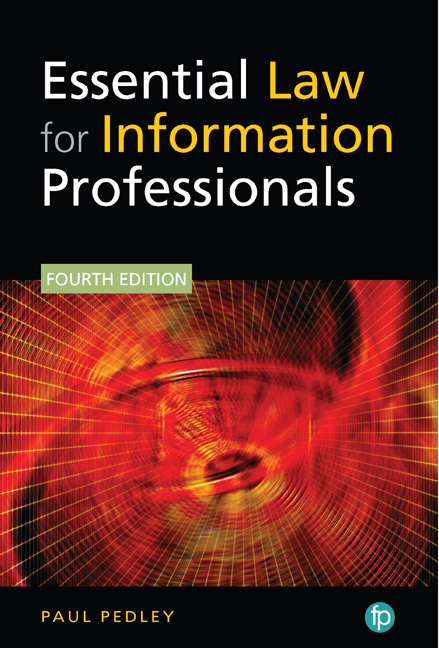Book contents
- Frontmatter
- Dedication
- Contents
- Disclaimer
- List of Figures and Tables
- Table of Statutes, Etc.
- Table of Cases
- Abbreviations
- Glossary of Terms
- Preface
- Chapter 1 General law and background
- Chapter 2 Library Law
- Chapter 3 Copyright
- Chapter 4 Legal Deposit
- Chapter 5 Breach of Confidence
- Chapter 6 Contracts and Licensing Agreements
- Chapter 7 Data Protection
- Chapter 8 Privacy
- Chapter 9 Freedom of Information
- Chapter 10 Human Rights
- Chapter 11 Re-use of Public Sector Information
- Chapter 12 Defamation
- Chapter 13 Professional Liability
- Chapter 14 Cybersecurity and Cybercrime
- Chapter 15 Disability Discrimination
- Chapter 16 Other Legal Issues Relevant to Librarians
- References
- Appendix 1 Brexit and the Orphan Works Exception
- Appendix 2 CILIP'S Ethical Framework
- Index
- Frontmatter
- Dedication
- Contents
- Disclaimer
- List of Figures and Tables
- Table of Statutes, Etc.
- Table of Cases
- Abbreviations
- Glossary of Terms
- Preface
- Chapter 1 General law and background
- Chapter 2 Library Law
- Chapter 3 Copyright
- Chapter 4 Legal Deposit
- Chapter 5 Breach of Confidence
- Chapter 6 Contracts and Licensing Agreements
- Chapter 7 Data Protection
- Chapter 8 Privacy
- Chapter 9 Freedom of Information
- Chapter 10 Human Rights
- Chapter 11 Re-use of Public Sector Information
- Chapter 12 Defamation
- Chapter 13 Professional Liability
- Chapter 14 Cybersecurity and Cybercrime
- Chapter 15 Disability Discrimination
- Chapter 16 Other Legal Issues Relevant to Librarians
- References
- Appendix 1 Brexit and the Orphan Works Exception
- Appendix 2 CILIP'S Ethical Framework
- Index
Summary
This chapter outlines key elements of the legislative framework governing the work of libraries. It covers laws that could impinge on the professional life of librarians.
Localism Act 2011
The Localism Act 2011 (Part 5 (Community empowerment), Chapter 3 (Assets of community value)) provides for a scheme called ‘assets of community value’ (the ‘right to bid’). This requires district and unitary councils to maintain a list of ‘community assets’. It is also known as the ‘community right to bid’.
The first stage of the community right to bid is the nomination of a community asset. Parish councils and community organisations may nominate land or buildings to their local authority. ‘Assets of community value’ covers buildings and amenities that are integral to the communities that use them, such as a village shop, a pub, a community centre or a library. There are numerous examples of libraries being nominated as assets of community value.
When listed assets come up for sale or change of ownership, the Localism Act 2011 gives local community groups time to develop a bid and raise the money required to buy the asset when it comes onto the open market. The right to bid only applies when an asset's owner decides to dispose of it. There is no compulsion on the owner to sell it. The scheme does not give first refusal to the community group, unlike the equivalent scheme in Scotland. It is not a community right to buy the asset, just a right to bid for it. This means that the local community bid may not be the successful one.
Certain types of land, most notably residential property, are exempt from being placed on the register. Owners of property placed on the register may appeal against its listing and can claim compensation if they can demonstrate that its value has been reduced as a result of being nominated as an asset of community value. Also, certain types of transfer of land or assets do not count as ‘disposals’ for the purposes of the legislation.
The community right to bid extends to England; the Welsh Government has not yet commenced it with regard to Wales.
- Type
- Chapter
- Information
- Essential Law for Information Professionals , pp. 19 - 28Publisher: FacetPrint publication year: 2019



